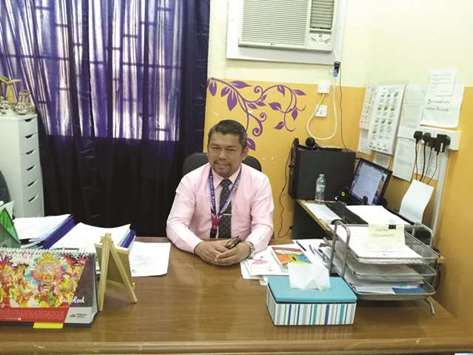Imparting education in a cross-cultural atmosphere in Qatar is more challenging than in the Philippines. However, these challenges also provide more opportunities for both students and teachers to learn new things and advance in their lives and professions.
These were the views shared by Jason Iyas, Principal of Philippines International School-Qatar (PISQ), with Community in an interview recently.
“There are many schools in Qatar from different countries. There are also students who come from different backgrounds and cultures. When they get together at a school, it is the duty of teachers to discipline and train them. It is challenging but an interesting task,” Iyas said.
He showed satisfaction with what he has learnt in Qatar. “I became principal of the school in 2015. I have been associated with the school since 2010. I first came to Qatar in 2007 as a teacher with another school but went back soon. Back in the Philippines, I quit teaching and started a private job.
“I returned to Qatar in 2010 after I got the job of a social studies teacher in PISQ. When I came back, I took my job as a challenge. Noticing my ability to carry out disciplinary work well, the school administration made me the prefect of discipline in the school. From that position, I learnt a lot. I observed the students, their parents, and our teachers very minutely. Then I started giving my suggestions to the school administration about how to improve the discipline and the academics.”
Iyas said, “I worked as the prefect for five years till 2015 when I was appointed a caretaker principal. As a principal I started paying more and more attention on enhancing the capacity of my teachers and enabling them to compete in the international market. In Qatar you have to compete with other schools and you have to satisfy the parents who pay their hard earned money for better education.”
He said there is a difference in the way education works in Qatar and the Philippines. “In the Philippines, there is no issue of other cultures. Though there are schools with students from other countries, the overall environment of the country is [more or less homogenous]. They focus on classroom matters only. However in Qatar, you have to educate the students not only about the academics but also about discipline and good morals. When the students go out they are considered a product of a certain school,” he noted.
He also explained what he has tried to do as the principal of PISQ. He said, “When I became the principal, I paid more attention to extracurricular activities for the students. I enabled them to take part in a contest held among all Philippines schools in the Gulf region. My students won different competitions in the contest in 2015.”
He said that the school started operations in 2000 and has kept on growing, having shifted campuses four times to accommodate the ever-increasing number of students. “We now have students from Qatar, India, Nepal, Egypt, and some African countries, besides the Philippines,” he noted.
“The total number of students at PISQ is about 3,000 and we have 130 teachers in total. The number of students is growing by five percent every year as there are only two Philippines schools in Qatar, whereas the community is considered the third largest expatriate community in Qatar, after Indians and Nepalis.”
He said that he has great interest in enabling practical learning for the students. “I always encourage my students to take part in practical learning and social activities. My students recently took part in the Eco-Schools project in association with the Doha Bank. The students were taught about environment-friendly living. They were taught how to save electricity, how to conserve water, and how to dispose of garbage properly.”
He added, “It is the beauty of Qatar that the students get opportunities to showcase what they have leant at school and in the classroom.”
Principal Iyas believes in an interactive approach. “I have very good ties with parents. I train my teachers continuously. I interact with my students. I seek suggestions from parents to improve learning at the school. The teachers are also encouraged to share their suggestions for better education.”
He said, “I want to make PISQ a better school than it was when I joined it. The desire for improvement is always there and this desire becomes a necessity in a multicultural environment.”

CANDID: PISQ Principal Jason Iyas in his office.
